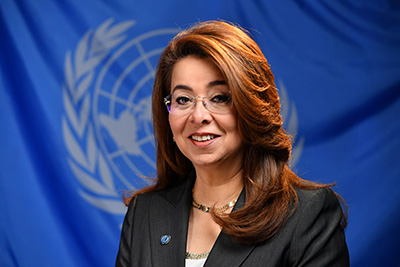Written by Ghada Waly, United Nations Office on Drugs and Crime Executive Director
Digital technologies hold the potential to empower people and unleash innovation for inclusive development.
However, without concerted action, new tech may entrench existing inequalities, while leaving the vulnerable exposed to threats of cybercrime and online exploitation.
It is too easily forgotten in our highly connected world that many remain left out of the online conversation.
In the least developed countries only 19 per cent were online last year, according to the Report of the Secretary-General on implementation of the recommendations of the High-level Panel on Digital Cooperation. The Internet user gender gap is growing, standing at 17 per cent globally and 43 per cent in the least developed countries.
As we have seen during the COVID-19 crisis, the digital divide harms the “unconnected” by depriving them of access to information, education and other vital services. It is a bitter irony that the same people stranded on the wrong side of the divide are preyed upon by cybercriminals when they get online.
There are increasing reports of women and children being groomed and exploited via the internet, amid the COVID-19 shutdowns, job cuts and school closures. In a June 2020 study, Europol reported strong indications of an increase in the number of child sexual abuse cases, with referrals from industry and third-party countries reaching record highs in recent months.
A new UNODC research brief found that the global disruption caused by virus has been quickly exploited by organized criminal groups engaging in phishing and credit card fraud, as well as using pirated websites for fake donations and other online scams.
SDG 16 on justice calls on countries to end abuse, exploitation, trafficking and all forms of violence against and torture of children, and to combat all forms of organized crime. In order to protect people and fulfil the promise of digital technology to drive positive change, governments need to do more to achieve these targets, including by preventing and countering cybercrime.
With this objective in mind, UNODC’s work focuses on strengthening international cooperation and building the capacity of police, prosecutors and judges to fight cybercrime and online child sexual abuse. Drawing on our Office’s expertise in countering all forms of organized crime, money laundering and corruption, we have helped create cybercrime investigative units to bring offenders to justice and support victims.
UNODC has worked with hundreds of thousands of children, parents and teachers so they understand online threats, stay out of harm’s way and reach out for help if they need it. As we have seen so clearly in the COVID crisis, the right information at the right time can save lives.
Looking ahead, we are scaling up partnerships across the UN system as well as with the private sector and civil society to innovate responses in the fight against cybercrime. Together, we can secure the benefits of digital technologies for those who need them most and contribute to achieving the SDGs in the Decade of Action.


